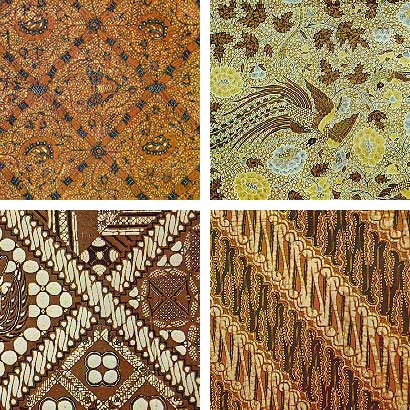
Batik originated from the Javanese language "amba", meaning to write and "point". The word batik refers to fabric with patterns generated by the material "night" which is applied to the fabric, so stop the entry of dye.
Batik is a craft that has high artistic value and has become part of the culture of Indonesia (especially Java) for a long time. Javanese women in the past made their skills in batik for a living, so in the past, batik work is exclusively women's work until the invention of "Batik Cap" which allows the entry of men into this field
Variety Batik style and color are influenced by various foreign influences. Initially, batik has a variety of shades and colors are limited, and some patterns may only be used by certain circles. However, coastal batik absorb various external influences, such as foreign traders and also in the end, the colonialists. Bright colors like red popularized by the Indonesians, who also popularized the style of the phoenix. European colonial nations are also taking interest in batik, and the result is a style of flowers that were not known (such as tulips) and the objects brought by the colonizers (the building or carriage), as well as favorite colors they like the color blue. Retain traditional batik coraknya, and is still used in traditional ceremonies, because usually each style has a representation of each.
Batik technique has been known for thousands of years ago. There is no historical information is quite clear about the origin of batik. Some suspect this technique comes from the Sumerian, then developed in Java after being taken by Indian traders. Currently batik can be found in many countries such as Indonesia, Malaysia, Thailand, India, Sri Lanka, and Iran. Besides in Asia, batik is also very popular in some countries in the continent of Africa. However, a very famous batik in the world is batik from Indonesia, mainly from Java.
Batik tradition was originally a hereditary tradition, so occasionally a recognizable motif batik originated from a particular family. Some batik motif can indicate the status of a person. Even today, some tadisional batik motif is only used by the family court of Yogyakarta and Surakarta.




0 comments:
Post a Comment